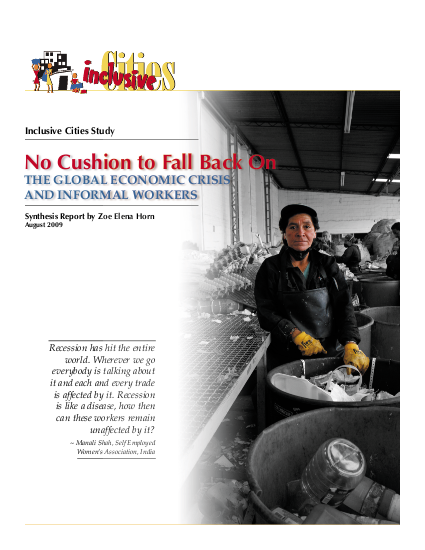
Much has been said about the impact of the global economic crisis on those employed in the formal economy while its impact on those employed informally – in enterprises and as wage workers – has received little or no attention. Individuals working within the urban informal economy in most developing countries are among the world’s poorest people, often earning less than USD 2 a day. To address the gap in information about the impact of the crisis on the working poor, the partners in the Inclusive Cities project collected information on the impact of the crisis on three categories of these workers – home-based workers, street vendors, and waste pickers. With overall guidance and co-ordination by the global network Women in Informal Employment: Globalizing and Organizing (WIEGO), interviews and focus group discussions were completed during June and July of 2009 that assessed broad changes for informal workers and their households over the previous six months, as well as specific impacts on the three different groups of informal workers. The research shows that informal enterprises and informal wage workers are affected in many of the same ways as formal firms and formal wage workers. Informal workers suffer directly and indirectly from shrinking consumption and declining demand crucial to their livelihoods. Informal wage workers are often the first to be laid off – before those with formal contracts. Informal enterprises and informal wage workers face increased competition as more people enter the informal economy and/or as more and more jobs are informalised. The three groups of urban informal workers experienced these general trends to different degrees and in different ways, as outlined below: • Waste pickers experienced the sharpest decline in demand and selling prices. They were most sensitive to the influence of the crisis on international pricing dynamics in their sector, which began as early as October 2008. • Home-based workers who produced for global value chains experienced a sharp decline in their work orders. Home-based workers who worked on their own account for local markets reported increased competition and many had to reduce their prices to remain competitive. • Street vendors also experienced a significant drop in local consumer demand. They reported the greatest increase in competition, as greater numbers of people who lost their jobs or had to supplement incomes turned to vending as a possible source of income. However, unlike some of their formal counterparts, those working informally have no cushion to fall back on. Respondents reported being forced to overwork, take on additional risks, cut back on expenditure (including food and health care), and still saw their incomes decline. The evidence strongly suggests that the global recession is pushing informal workers and their families further into impoverishment. This study thus highlights that the crisis has hit the world’s working poor particularly hard and that it may have longer lasting effects on informal workers than on those employed in the formal sector. Informal workers had a range of suggestions for action by government, non-governmental organisations, and local associations of informal workers to alleviate the effects of the crisis and improve their overall situation, and these are reflected in the report. Worker recommendations include emergency measures like soup kitchens but also a moratorium on state actions – like evictions – that make their livelihoods even more vulnerable. They also made suggestions for systemic change like greater legal recognition and protection for informal workers. Informal workers participating in the study emphasised the need to act quickly. This report is the first output of a year-long study that will continue to monitor the impact of the economic downturn on people employed in the informal economy.
Resource collections
- Accountability to affected populations (AAP)
- Innovation
- Topics
- UN Habitat - Urban Response Collection
- Urban Response - Urban Crisis Preparedness and Risk Reduction
- Urban Response Collection - Community Engagement and Social Cohesion
- Urban Response Collection - Economic Recovery
- Urban Response Collection - Environment and Climate Change
- Urban Response Collection - Housing, Land and Property
- Urban Response Collection - Urban Crisis Response, Recovery and Reconstruction
- Urban Response Collection - Urban Resilience
